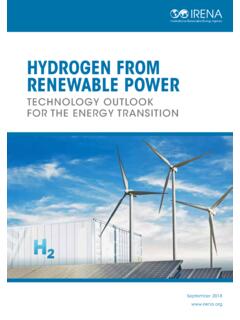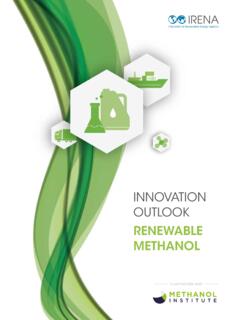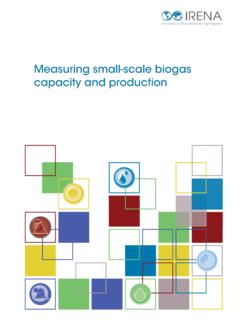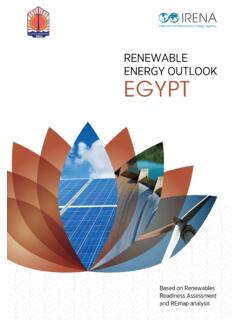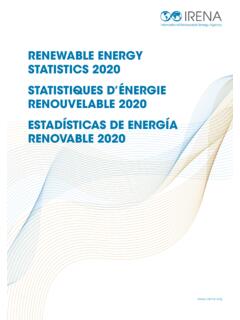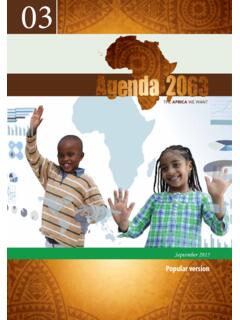Transcription of Powering Access, Resilience and Prosperity
1 The Renewable Energy Transition in africa Powering Access, Resilience and ProsperityOn behalf of theDisclaimerThis publication and the material herein are provided as is . All reasonable precautions have been taken by the Authors to verify the reliability of the material in this publication. However, neither the Authors nor any of its officials, agents, data or other third-party content providers provides a warranty of any kind, either expressed or implied, and they accept no responsibility or liability for any consequence of use of the publication or material information contained herein does not necessarily represent the views of all countries analysed in the report.
2 The mention of specific companies or certain projects or products does not imply that they are endorsed or recommended by the Authors in preference to others of a similar nature that are not mentioned. The designations employed, and the presentation of material herein, do not imply the expression of any opinion on the part of the Authors concerning the legal status of any region, country, territory, city or area or of its authorities, or concerning the delimitation of frontiers or Renewable Energy Transition in africa | ForewordForewordEnergy is the key to development in africa and the founda-tion for industrialisation.
3 Like in Europe and other parts of the world, the expansion of renewables goes beyond the provision of reliable energy and climate protection. Economic develop-ment as a whole will benefit and new jobs and opportunities for entire industries will emerge. Reliable, sustainable energy is at the same time indispensable for ensuring that people are provided with important basic services such as health care and safe drinking its unparalleled potential for renewables, Afri-ca s starting point for the transformation of the energy sec-tor is strong.
4 This said, electricity supply in africa is lagging considerably. Most people in Sub-Saharan africa face severe energy poverty. Less than half of the population had access to electricity in 2018. Further, in terms of its size and popula-tion, africa is well behind the rest of the world with regard to the deployment of renewable energies. In 2018, only 20 per cent of the electricity generated in africa was from renewa-ble sources. Compared with the rest of the world, investment is low.
5 In 2019, two-thirds of all newly added energy capacity for supplying electricity worldwide was based on renewable sources. However, only a mere two per cent of this new gene-rating capacity was in africa . Yet forecasts indicate that africa could double its energy demand by 2040. At the same time, africa is still investing in energy from fossil fuels. A change of direction is needed in the energy sector. By harnessing the potential of renewable energy, africa s young, dynamically growing economies can ensure energy supply is generated in line with international climate joint goal must, therefore, be to support African countries in transforming their energy sectors.
6 With agenda 2063 : The africa We want , African Heads of State and Government have drawn up a roadmap to achieve inclusive and sustainable growth and development. One of the important topics covered is access to affordable, reliable and sustainable energy for all SDG 7 of the 2030 agenda . The international community, multilateral organisations and bilateral donors stand ready to partner with African countries on their path towards sustaina-ble growth and work with them to develop and implement so-lutions to attain that energy is the answer to the challenges of climate change and a critical step for reaching climate neutrality.
7 Without the global transformation of the energy sector, it will be impossible to achieve the degree target of the Paris prerequisites for the transformation of the African energy sector are in place. Crucial factors, in addition to know-how and technology, are the political and regulatory environment. Technology solutions are abundant, cost competitive with fos-sil fuels, and are ready to be deployed. The necessary ele-ments, such as stable energy systems, reliable regulatory and financial policy frameworks, ambitious policy goals and appropriate markets, including regional ones, are increasingly available or can be study shows how the transformation of the African energy sector can succeed and what opportunities and challenges lie ahead in the next 30 years.
8 It identifies key tools that can be utilised to accelerate the energy transition in the African conti-nent and achieve universal access to electricity. Most import-antly, the study demonstrates that SDG 7 can be achieved in africa by 2030. africa can become a Green us join forces to achieve this goal Gerd M ller, Member of the German BundestagFederal Minister for Economic Cooperation and DevelopmentFrancesco La CameraDirector-General, International Renewable Energy Agency (IRENA)5 The Renewable Energy Transition in africa | Executive summaryExecutive summaryOver the coming decades, the countries on the African conti-nent can address fundamental challenges of energy access, energy security and climate change.
9 Countries still suffering from energy poverty can achieve universal access to afforda-ble, reliable, sustainable and modern energy for all by 2030, as set out in the UN s Sustainable Development Goal 7, im-proving the livelihoods of hundreds of millions of their citizens. At the same time, africa can harness its abundant potential of increasingly cost-competitive renewable energy to service growing demand for electricity and avoid a potential fossil-fu-el lock-in. Even with efficiency measures in place, energy de-mand in African economies is expected to nearly double by 2040, as populations grow and living standards improve.
10 By choosing sustainable energy sources over fossil fuels, africa can create new jobs, experience greater economic growth and harvest social and health benefits while helping to mitigate de-vastating impacts of climate leaders have made clear their commitment to attaining inclusive and sustainable economic growth and development in the agenda 2063 : the africa We want . Achieving universal energy access is a critical underpinning of resilient and pro-sperous economies and societies and remains a top priority for African nations.


